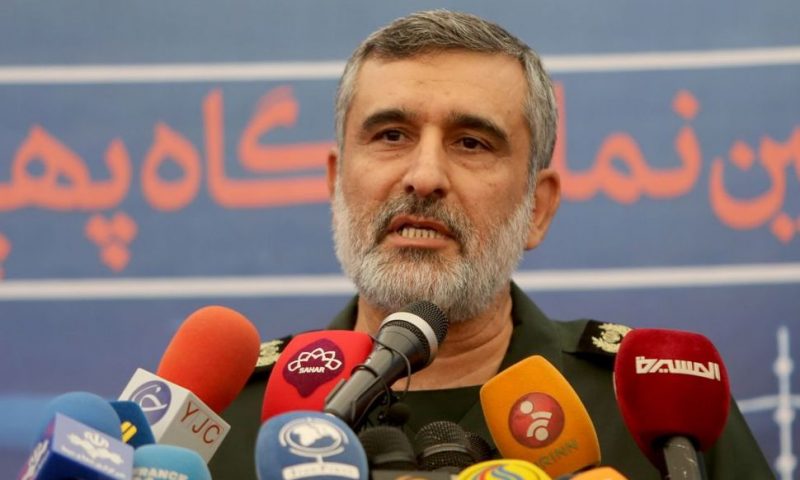An assertion on Friday that it had defeated U.S. drones in the region was met with incredulity by analysts, but it appears to indicate broader concerns in Tehran.
A SERIES OF EXTREME claims Iran has made in recent weeks appear to reflect the regime’s persistent fears it has not yet responded strongly enough to President Donald Trump’s decision to kill prolific Iranian military commander Qassem Soleimani earlier this year, officials and analysts believe.
The head of air operations for the Islamic Revolutionary Guards Corps claimed Friday that his country had reverse engineered a U.S. surveillance drone Iran shot down last summer – a provocative attack that almost prompted a sharp military escalation with the U.S. at the time. Now, Iran claims, it has the technology to defeat the drones.
“We are now familiar with all its codes and frequencies, meaning that we can deactivate it not from a 100 kilomter distance, but from thousands of kilometers away from Tehran,” IRGC Aerospace Force Brig. Gen. Amir Ali Hajizadeh said in a press conference of the MQ-4 Triton drone. His comments came a day after the IRGC released new footage of the wreckage of part of that drone.
The claim is ridiculous, multiple analysts and experts tell U.S. News. Were Iran to develop the capability to extract such information – an incredulous feat in itself – it would serve its own best interests to keep that a secret, not broadcast it publicly, so it could continue to glean information about U.S. drone operations in the region. And if the latest claim were true, then the U.S. could simply change the codes it uses for its aircraft.
“In making such extreme claims, he made the debunking easy,” says Peter Singer, a strategist and senior fellow with the New America think tank. “He would have been better off just saying his girlfriend goes to another school than claiming Scarlett Johansson is coming to prom with him.”
But the claim appears to be part of a surge in propaganda focused on the potency of Iran’s military and intelligence apparatus that could indicate Tehran remains unconvinced it has responded forcefully enough to Trump’s surprise decision to kill Soleimani in a drone strike on Jan. 3. Iran’s top leaders claimed the subsequent response of firing ballistic missiles from its territory at two U.S. bases in Iraq – which the Pentagon confirmed – killed dozens of American troops, despite U.S. evidence that the attack resulted in no deaths or serious injuries aside from those diagnosed with concussions, or traumatic brain injury.
Widespread protests in Iran against the act of U.S. aggression targeting one of the most visible figures in the Iranian regime soon gave way to a student-led uprising against the regime after Iran mistakenly shot down a Ukrainian passenger jet less than a week after Soleimani’s killing.
The regime has not orchestrated the kind of harsh crackdowns that have met prior protests, perhaps indicative of the weak position that Tehran finds itself. Now, some analysts suggest, it feels the need to demonstrate its power for a domestic audience and its friends internationally.[
“They want to appear strong in the wake of Soleimani’s death. Their narrative has been they have responded to the attack and have shown they have challenged ‘U.S. hegemony,'” says Karl Kaltenthaler, a professor at the University of Akron and adviser to the U.S. military on Iran matters.
Iranian state news and its government’s official statements have centered on the idea that forces loyal to Tehran have succeeded in challenging U.S. dominance over Middle East affairs, he says.
“They are likely self-conscious that their armed response was pretty token and was not meant to really kill Americans in any numbers.”
The latest claim follows a series of similarly outlandish assertions from Tehran in recent weeks, including that it downed the U.S. E-11A surveillance plane that crashed in Afghanistan earlier this month – and that, according to Iran and its backers, at least one senior CIA official who orchestrated the Soleimani killing was secretly on board. Other claims from Iranian state news indicate that “dozens” of CIA officials were killed in the crash.
A source familiar with the investigation told U.S. News on Thursday that the U.S. military has confirmed only the plane’s two pilots were on board, in keeping with initial assertions from the Pentagon. And military investigators are no longer considering outside factors such as either a surface-to-air missile or enemy electronic interference as the cause of the crash, which now appears certainly to have been the result of a technical malfunction.
Iran also announced earlier this week that it will execute a man currently in custody who it alleges gave nuclear secrets to the CIA. This follows claims from Iran that it rounded up 17 CIA spies it also plans to prosecute.
Indeed Iran has frequently made what even it considers to be easily disprovable claims about its ability to defeat the U.S. militarily – principally to convey to the Iranian people that their government can protect them, says Chris Harmer, an Iran analyst and former U.S. Navy commander. He also points to the effect of “the decrepit state of the Iranian economy” as Iran continues to come under U.S. and international sanctions.
“It is increasingly apparent that the Iranian people no longer believe the regime’s lies,” Harmer says.

